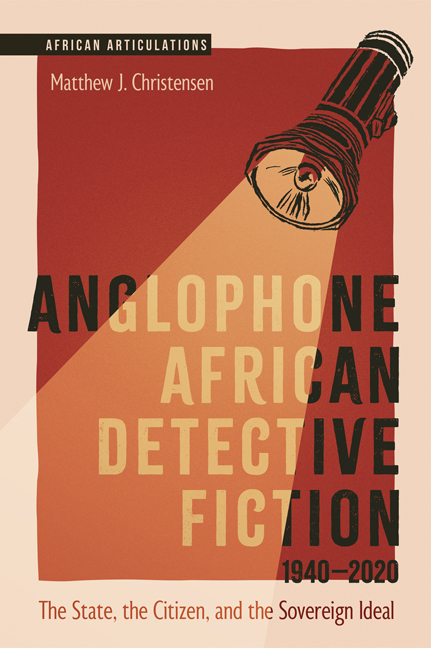Book contents
- Frontmatter
- Dedication
- Contents
- List of Illustrations
- Acknowledgements
- Introduction
- Part 1 Africanizing Detective Fiction’s Un/Sovereign Subjects
- Part 2 Neoliberal Noir
- Conclusion: The Future Imperfect
- An Anglophone African Detective Fiction Bibliography, 1940–2023
- Bibliography
- Index
- Miscellaneous Endmatter
5 - Seriality, Stasis, and the Neoliberal State
Published online by Cambridge University Press: 11 May 2024
- Frontmatter
- Dedication
- Contents
- List of Illustrations
- Acknowledgements
- Introduction
- Part 1 Africanizing Detective Fiction’s Un/Sovereign Subjects
- Part 2 Neoliberal Noir
- Conclusion: The Future Imperfect
- An Anglophone African Detective Fiction Bibliography, 1940–2023
- Bibliography
- Index
- Miscellaneous Endmatter
Summary
While the neoliberalization of the African state has generated new conditions of political exclusion and new forms of violation for those individuals and communities unable to harness capitalism's privileged mechanisms of economic advancement, the neoliberalization of the publishing industry during the same period has, paradoxically, given African writers of detective fiction a new instrument to represent and critique some of the specific neoliberal rationalities responsible for these emergent forms of subjugation. The new tool is the franchised novel series. While not new per se, novel series publication only becomes widely available to African writers in the first years of the 2000s. Once accessible, writers from West, East, and Southern Africa began to experiment with the narrative possibilities of seriality to build profitable brands, but also to explore the types of critical engagements made possible by a long-form series.
I have emphasized elsewhere in this book that the crime mystery is as much a genre of time as it is of investigation and discovery. Within an individual story, a detective fiction writer's ability to make effective use of suspense, delayed exposition, and a future perfect narrative grammar, as well as to play on the genre's implicit promise of future justice, is as important in sustaining a reader's attention as the fabrication of a seemingly unsolvable mystery. As the Nigerian writers of the 1970s and 1980s whom I examined in Chapter 3 additionally make clear, the strategic manipulation of narrative time also expands the genre's potential for social critique, especially for what the mystery genre can be made to reveal about the arrested teleology of decolonization. With seriality's expanded repertoire of temporal devices – namely, multi-novel plot lines and repetition – the series affords writers additional and unique opportunities to historicize the neoliberalization of everyday social life. The series format turns out to be equally productive for dissecting neoliberalism's own temporalities for their material and epistemic impact on the ongoing decolonial project.
As critical theorists emphasize, those impacts are significant. David Harvey (1991), for instance, contends that the delinking of nation and capital in favor of flexible production and flexible accumulation on a global scale has put the notion of national development, and with it its temporal registers, at risk of becoming irrelevant.
- Type
- Chapter
- Information
- Anglophone African Detective Fiction 1940-2020The State, the Citizen, and the Sovereign Ideal, pp. 143 - 168Publisher: Boydell & BrewerPrint publication year: 2024

